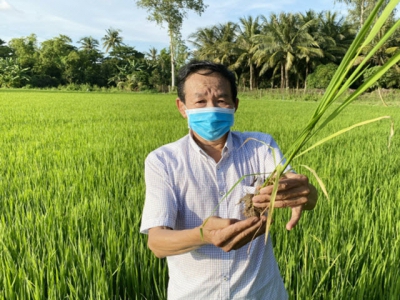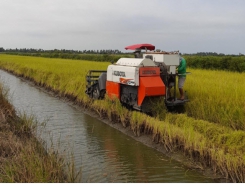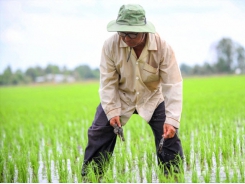Rice straws and microbial products - the fertilizer-saving combo

Processing rice straws with microbial products creates a great source of organic fertilizers which reduces the use of chemical fertilizers and pesticides by 30 - 50%.
Mr. Huynh Trung Thu (Da Phuoc commune, An Phu district, An Giang), uses Emuniv microbial products to process rice straws right in the field to create organic fertilizers - a great source of nourishments for rice plants. Photo: Le Hoang Vu.
Farmers in many localities in the Mekong Delta currently focus on reducing the use of chemical fertilizers, at the same time increasing organic fertilizers usage and application of smart solutions for inorganic fertilizer.
Several notable actions include the utilization of inorganic fertilizers with slow-dissolving technology or the use of microbial inorganic fertilizers to facilitate the plants’ absorption and minimize fertilizer loss to the natural environment.
Particularly in recent years, the Center for Organic Agriculture (Vietnam National University of Agriculture) has successfully researched the EMUNIV microbial products, later transferred to local farming households. The in-field rice straw processing model using EMUNIV is proved to be very effective in provinces and cities nationwide.
EMUNIV quickly breaks down rice straw into humus, prevents organophosphate (OPs) poisoning for plants, balances soil pH, improves microflora, inhibits and eliminates fungal diseases in the soil.
Mr. Huynh Trung Thu (Da Phuoc commune, An Phu district, An Giang), with support and guidance from the Centre for Organic Agriculture Promotion and Studies (COAPS), has used EMUNIV for the past three years to process rice straw right in the field to create organic fertilizer, which is a great source of nourishments for rice plants.
The efforts paid off. After applying this solution, his family’s 15 ha of rice experienced a drastic drop in the amount of inorganic fertilizers used, from over 50 kg/1,000m2 to only 35 kg/1,000m2.
The entire rice field grew stronger, less pests while limiting the use of pesticides. The final product had good quality with beautiful design and zero drug residue upon testing.
Rice farmers in Can Duoc district, Long An, have recently linked together to form large fields. They aim to facilitate mechanization and synchronously apply scientific and technical advances to production.
Large fields are mainly in the four communes of Phuoc Dong, Tan Lan, Tan An and Long Son (nearly 300 ha). The production process is carried out through enterprises underwriting the final products. This approach helps farmers improve profits by reducing costs, increasing productivity, and product quality stabilizing output.
Mr. Nguyen Thanh Liem (Ba Chu hamlet, Tan Lan commune, Can Duoc district, Long An) plants rice in an area of 2.3 ha. After using EMUNIV, results showed that productivity increased by 19%, profit increased by 18-33% (from VND 3.2 to 5.8 million/ha) compared to the old procedure.
In the 2021 winter-spring and autumn-winter crops, Mr. Liem's family all apply EMUNIV to process rice straw in the field. The process is as follows:
With the dosage of 5-7 kg/ha, EMUNIV will be mixed with powdered soil and sprinkled on the straws in the drained field.
After that, the straws will be buried under the mud, and the field will be left open for ten days.
Let the sludge settle for 1-2 days and then carry out the sowing or transplanting process. This will help the stems grow stronger while the leaves will be able to maintain their greenness longer.
Ms. Bui Thi Hong Ha, Head of Agricultural Microbiology Laboratory (COAPS), said, "Thanks to the microbial product models, the use of chemical fertilizers can be reduced by 30 - 50% depending on the amount of rice straws used in the field. Pesticides are also be reduced by 30 - 50%, even over 50% in some cases."
According to Mr. Nguyen Van Khang, an officer of the Plantation and Plant Protection Station of An Phu district (An Giang), the cost of fertilizers and pesticides currently accounts for a large proportion of the total cost in rice cultivation. This happens in the context that the price of fertilizers and pesticides is in constant increase.
Therefore, proactively implementing organic solutions to reduce fertilizers and pesticides is very important to ensure profits for rice farmers while contributing to environmental protection.
Related news
Tools

Phối trộn thức ăn chăn nuôi

Pha dung dịch thủy canh

Định mức cho tôm ăn

Phối trộn phân bón NPK

Xác định tỷ lệ tôm sống

Chuyển đổi đơn vị phân bón

Xác định công suất sục khí

Chuyển đổi đơn vị tôm

Tính diện tích nhà kính

Tính thể tích ao




 Strengthening the role of structural and non-structural measures…
Strengthening the role of structural and non-structural measures…  Notable imprints of rice farmers in the Mekong…
Notable imprints of rice farmers in the Mekong…